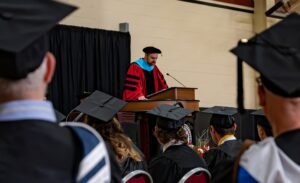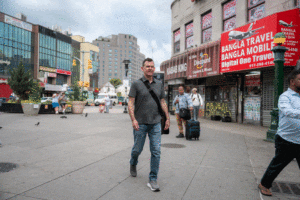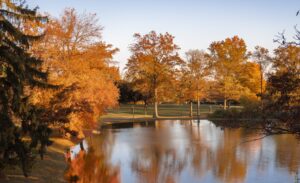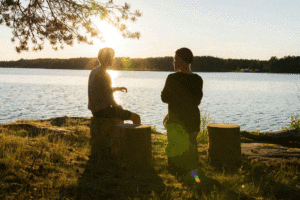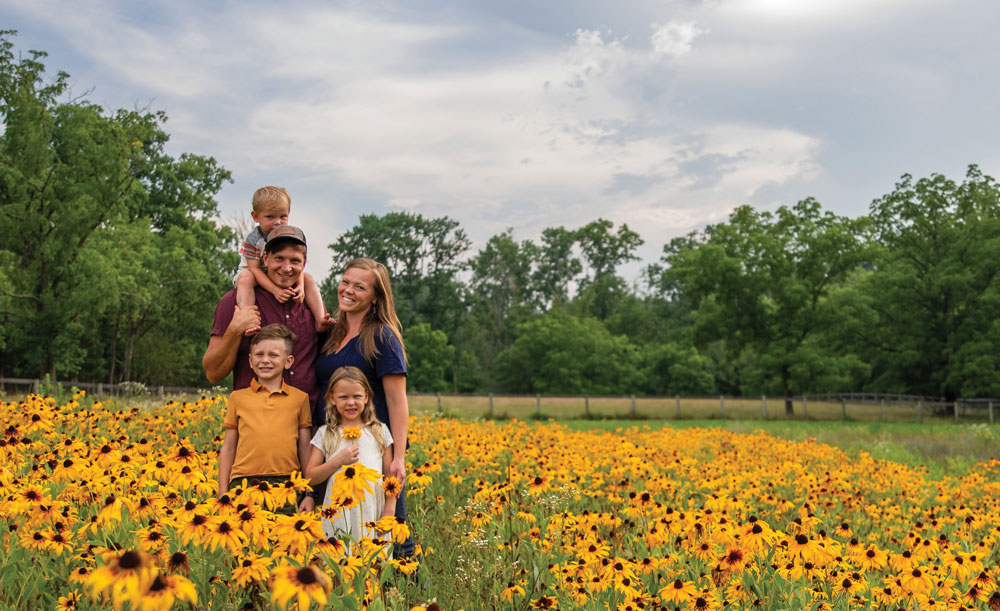
“If we ever did move to a farm, what would we name it? Jones Family Farm?” This was the question Kevin Jones ’09 posed to his wife, Kristin ’10, before any realistic chance of moving to a farm was plausible.
“I have an idea,” Kristin replied. “Like a Mustard Seed Farm. It’s a bit of a mouthful, but we would need faith every single day.”
“I like it. But we’re not becoming farmers anytime soon.”
One week later, Kevin took Kristin’s hand as they toured a vacant farm property, 30 acres of neglected farmland in Perkasie, PA. As they walked, Kristin’s head filled with questions:
We can’t afford this farm. There’s no way this is a responsible decision. But why does it feel right? How could we farm without skills? What do we do with this seemingly barren land? Is it right to uproot our kids and force them into this stressful lifestyle? Jesus, you need to make it very clear. What do you want us to do?
They stopped. Kristin looked down. The realtor was speaking, but she didn’t hear his words. At her foot was a wild mustard plant.
“Kevin, do you know what this is?” she asked.
“A weed?”
“It’s a mustard plant.”
They looked at each other and immediately understood. This idea of two non-farmers starting a farm that would be the sole income for their family was only crazy if the Lord was not in it. It is something they could only do by his strength and with faith like a mustard seed.
Guess we had a name picked out after all.
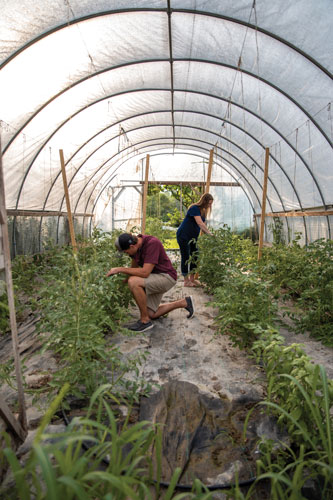
Kevin and Kristin managed to meet and fall in love during the three semesters that Kevin spent on campus after completing a year at WWC. “We became fast friends, and after Kevin came to his senses, we became a couple.”
Several years and a couple of kids later, Kevin was working in a management position at a local Chick-fil-A with the intention of one day becoming a store operator. He wanted to own a business where he could involve his family and pass it on to them one day. That dream remains, but it now involves a lot more than just chicken.
At the height of the Covid frenzy in May 2020, Kevin was laid off. In June, they found the mustard plant. And by Labor Day Weekend, their family of four-soon-to-be-five had moved into the old farmhouse on the newly established “Like a Mustard Seed Farm.”
When reviewing this nearly single-season timeline, “rushed” might be a word that comes to mind. The Joneses would be the first to admit it was a whirlwind. They will also say it was all in God’s perfect timing. You might also think, “What qualifications do they have to be farmers?” They would respond, “None whatsoever. We’re terrible farmers. But we love people. And God had bigger plans for the farm.”
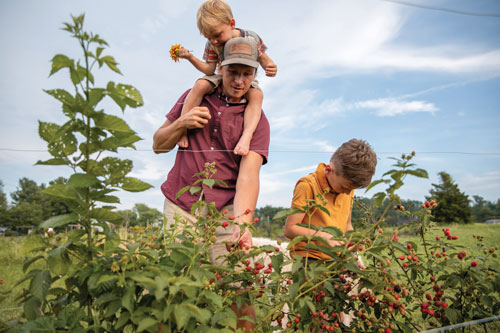
Shortly before Kevin lost his job, Kristin had been struggling with various health issues that pushed her to research the food she was eating and feeding her family. A graduate of the University’s School of Education, Kristin loved to read, research, and share what she was learning. She read a lot about regenerative farming: how working with the land and the natural integrated ecosystems God designed produced a kind of food that was better for not only the environment but also for those consuming it. This research cast a vision. How wonderful would it be to have their own little regenerative farm, where chickens lay soy-free eggs and fertilize the ground so that berries, tomatoes, and fruit trees can thrive in rich soil and produce good food for their family? So while Kevin’s job loss was difficult, it was the catalyst they needed to make big decisions and press toward a goal that had been building for some time.
Kevin and Kristin consider themselves first-generation farmers, although if they’re getting technical, they will say they are “skip-a-generation” farmers. Kevin’s grandparents had a rich legacy of farming, but like many families, the struggles they encountered led their children to choose different lifestyles. Kevin’s dad became a farm machinery mechanic, which meant that Kevin was raised farming-adjacent but missing the bulk of hand-me-down, practical farming knowledge from his ancestors. They were not totally starting from scratch, but they were still left to learn those essential first-time lessons themselves.
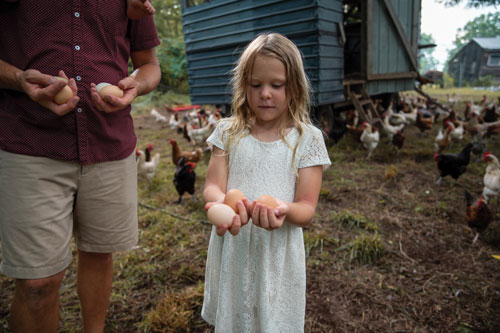
So, that’s the resume. A lot of research, some family in farming, and a dad who knew where to get and how to fix some essential machinery. Oh, and faith like a mustard seed. That’s the part that made it all work. Work exactly as they intended? Definitely not, but the farm stands today as a testament of God’s faithfulness to bring forth exactly what the Joneses needed for their family and farm to thrive.
Plow to the ground, the Joneses found themselves in their first couple years of farming with more failures than successes. Their entire colony of honeybees died in the first winter storm. A sunflower field that Kristin planted by hand never shot up. Out of an entire field of fruit tree saplings, only one turned into a (rather small) tree because of a drought. These failures came in-hand with small wins, like thriving tomato plants and an abundance of eggs, but nevertheless, it was hard to not be discouraged. If the ground did not produce, the farm would not have produce to sell. And without produce, the farm would never be able to support their family. Something needed to change.
With a lot of prayer and reflection on everything they learned from their failures, Kevin and Kristin made the decision to change the model of the farm from production to education. This idea started with processing chickens. A homeschool co-op approached Kevin and Kristin and asked them to teach them how to butcher chickens. Though they were shocked to hear there was interest, Kevin and Kristin created a lesson plan and taught elementary-aged kids the process from start to finish. Defying all expectations, the day was a hit. Kevin and Kristin looked at each other and said: “Whatever that was, we want to do more of that.” And the business model of educational programming was born.
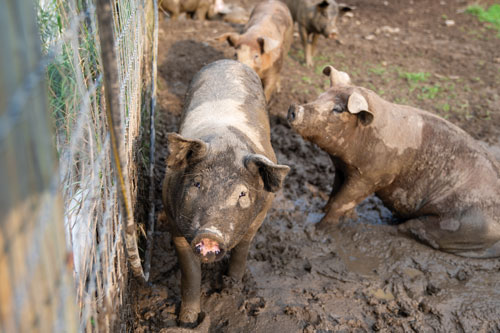
Kevin had the idea for an “adopt-a-hive” program for local families. The families helped build and decorate bee boxes, learned the essentials of beekeeping, and continue to visit the farm monthly
to take care of the hives and harvest their own honey. This gave the Joneses the opportunity to invest in and learn alongside families as they raised their children. Suddenly, the amount of honey the farm could produce was no longer the goal. It became about people, giving them a theology of food, and bringing them back to a garden. It was using the mustard-seed faith to build the Kingdom of Heaven.
This education model has since permeated every other part of the farm. The Joneses grow and raise a little bit of a lot of things to have a diverse ecosystem that works together. They invite the community to participate in nearly every part of it. The bees pollinate the wildflower field, which is a local pick-your-own attraction every summer. Elderberry shrubs bloom every summer so that moms can pick berries and turn them into medicinal syrups. The chickens lay eggs and are moved all over the farm to receive the best feed and then later fertilize the ground. Pasture-raised turkeys turn into the best thanksgiving dinners for a small number of local families. The same goes for the pigs. Cows, goats, and sheep also do their part to contribute to a farm that thrives from the presence of animals and crops.
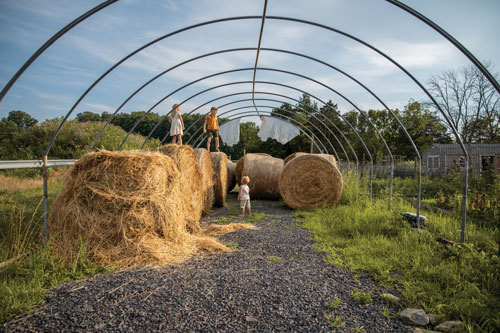
They’ve also extended this farm education into summer camps focused on farming and wilderness schools. Children at farm camp learn how to care for chickens and collect eggs, beekeep, and steward the land. Wilderness camp gives students vital survival skills like fire-building and shelter-making. Passionate about homeschooling, the Joneses see every facet of their farm as an opportunity to invite other homeschool families to learn about God’s creation and build valuable life skills that are no longer commonplace. They have a thriving homeschool co-op that meets weekly on the farm to learn in and through God’s creation.
Owning a farm was never part of Kevin or Kristin’s original idea of what their life would look like together. And while the farm did eventually enter that picture, its present state looks vastly different from their initial intentions. But that’s what makes the story of “Like a Mustard Seed Farm” so beautiful. It is a journey that turns moments of unexpectedness into testaments of God’s faithfulness, simply because two people were willing to step back from their dreams and let the Lord lead.
This article was originally published in the Fall 2024 issue of Cairn magazine.

